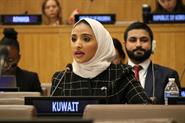Date : 01/10/2022

NEW YORK, Oct 1 (KUNA) -- The State of Kuwait on Saturday reaffirmed commitment to the UN efforts to improve the living conditions for all peoples, particularly the marginalized segments of the society.
"Kuwait is keen on cooperation and experience sharing with all nations to ensure social development and welfare for all people inside Kuwait and around the globe," Diplomatic Attache of Kuwait Mission to the UN Mawadah Hani Al-Mansour.
She made the comments in a speech to the 76th session of the UN General Assembly Third Committee (Social, Humanitarian and Cultural).
"Kuwait attaches special care for provision of social protection to vulnerable segments of society, notably the elderly and the sick people who are no longer able to work," she pointed out.
The Kuwaiti diplomat cited Article 11 of the Constitution as an evidence of the State guaranteeing of social insurance and healthcare for vulnerable people.
In keeping with the constitutional provision, the Kuwaiti government launched "Afya" health insurance program for pensioners, Al-Mansour noted.
"Out of belief in the central role of family, Kuwait Constitution provides, in its ninth article, for protection of family as a nucleus of social development.
"Kuwait has a robust policy for protecting the rights of people with disabilities pursuant to the provisions of the Convention on the Rights of Persons with Disabilities," she said, highlighting the legislations aiming to ensure the ability of those persons to contribute to the development and prosperity of the society.
The political leadership, realizing the importance of youth empowerment, established a state ministry for youth affairs and developed legislations to upgrade the living and academic life of the youth.
Out of belief in human development, Kuwait Vision 2035 focuses on the need to improve the quality of life for all citizens through modern infrastructure and world-class educational, health and housing services, she added.
The Third Committee session, which opened yesterday, debates the lingering impact of the COVID-19 pandemic, a resurgence of conflicts, the climate emergency and exacerbated inequalities on social development. (end)
asf.gb